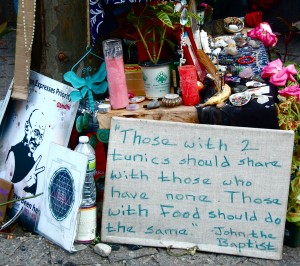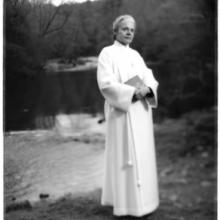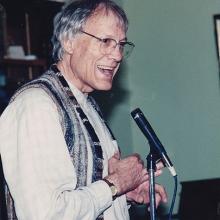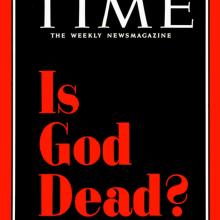theologian
In the summer of 430, the great Christian writer and bishop Augustine of Hippo lay dying as barbarians besieged his North African city – basically a mop-up operation in the slow-motion fall of the Roman Empire.
Today, in the fall of the year 2016, a lot of Christians can relate.

Image via Renata Sedmakova/Shutterstock.com
For me, the question of what to do with Yoder is not only an academic issue but a personal one. I was Yoder’s graduate assistant — and would be his next-to-last — for two years. Academically, how I teach my “War and Peace in the Christian Tradition” course is indebted in great extent to what I learned from him. As evident in numerous footnotes, my scholarship and publications, including for Sojourners, over the last two decades on just war and just policing also owe a lot to both his research and his mentoring.
Nevertheless, after this semester, I am leaning towards Blanton’s recommendation of setting Yoder’s work aside, at least for the foreseeable future. I think it is now possible to rely on the work of others for persuasive defenses of nonviolence and for strong critiques of Niebuhrian realism. I struggled over whether to use one of his books or essays in my course this semester. I hesitated to say anything about Yoder’s misconduct to my students. It took me a while before I did so.
What to do with Yoder? I’m not sure.
With her gray hair tied neatly in a bun and her wire-rimmed glasses perched thoughtfully on her nose, Ellen Davis looks the part of a distinguished Bible scholar.
Her resume certainly reads like one – a Ph.D. from Yale University and teaching appointments at Union Theological Seminary, Virginia Theological Seminary, Yale, and now Duke Divinity School.
Yet despite the traditional cast, Davis is leading a quiet revolution. For the past 20 years, she has been at the vanguard of theologians studying the biblical understanding of care for the land.
Oklahoma’s devastating tornado stirred up a theological debate that was set off from a series of deleted tweets referencing the Book of Job.
Popular evangelical author and speaker John Piper regularly tweets Bible verses, but two verses he tweeted after the tornado struck some as at best insensitive and at worst bad theology:
“Your sons and daughters were eating and a great wind struck the house, and it fell upon them, and they are dead.” Job 1:19
“Then Job arose and tore his robe and shaved his head and fell on the ground and worshiped.” Job 1:20
In the Book of Job, God allows Satan to afflict “blameless” Job, killing his 10 children, livestock and servants. While Piper’s tweets didn’t mention the tornado by name, critics said it was too close, and inappropriate.
Piper, who recently retired from the pulpit of Bethlehem Baptist Church in Minneapolis, is a leading theologian of the neo-Calvinist movement that’s sweeping many evangelical churches. In essence, Desiring God staffer Tony Reinke wrote, Piper was highlighting God’s sovereignty and that he is still worthy of worship in the midst of suffering and tragedy.
Nearly eight years ago, professor Richard Lischer got a call on his cell phone that would tear at his heart and test his faith.
It was his grown son, a successful lawyer, telling him his cancer had returned.
The ensuing 95 days in which Lischer — a man used to offering pastoral advice to others — stood by his son, Adam Ewers Lischer, as he lost his battle to cancer is now the subject of an eloquent memoir, Stations of the Heart.
Grief as the subject of memoir is now commonplace. But this volume, written by a professor of preaching at Duke Divinity School, conveys not only the anguish of grieving families, but also offers testimony to a faith that is tested but survives.
Walter Wink, 76, a world-class biblical scholar and non-violent practitioner, crossed over to God on May 10 at his home in Western Massachusetts. Following a slow decline, he had been in hospice for several weeks in the company of his beloved June and their family. (See "Confronting the Powers," Sojourners December 2010)
As a first year seminarian in New York City, more than 35 years ago, I was fortunate to have Walter as my New Testament instructor. In a seminar session on the "pearl of great price" in Matthew, I have a vivid memory of him breaking the discussion so we could go round the circle and each reply to the question: "For what would you be willing to die?" I don't so much recall my own halting answer, as the depth of the question he understood was put to us by the text. It's since become my conviction that no one should escape seminary (or baptismal preparation for that matter) without facing with that query.
Which is to say he was himself an engaged scholar, connecting the academy with the risk of the streets. While filling his first teaching post at Union Seminary in New York he was simultaneously serving on the national steering committee of Clergy and Laity Concerned about the War in Vietnam (1967-76).
He was notorious for foundation-shaking works. When I met him, Walter was a rising star in the biblical guild, on the fast track at Union. Then he published a little polemical book called The Bible in Human Transformation (1973) which made bold to declare, “Historical biblical criticism is bankrupt." It assailed the myth of scientific objectivity, the disembodied approach which kept the text at arms length and pre-empted commitment. In many respects it anticipated the contextualizing hermeneutics of feminist and liberation readings, but it didn't win him friends in the academic guild.
PORTLAND, Ore. — William Hamilton, the retired theologian who declared in the 1960s that God was dead, died Tuesday in his downtown Portland apartment. He was 87.
Hamilton said he'd been haunted by questions about God since he was a teenager. Years later, when his conclusion was published in the April 8, 1966, edition of TIME Magazine, he found himself at the center of a theological storm.
TIME christened the new movement "radical theology," and Hamilton, one of its key figures, received death threats and inspired angry letters to the editor. He lost his endowed chair as a professor of theology at what was then Colgate Rochester Divinity School in 1967.
 One of the constant threads in scripture is, "Give us this day our daily bread." Nothing more, nothing less. Underneath this admonition is the assumption that the more we store up for tomorrow the less people will have for today. And in a world where 1 percent of the world owns half the world's stuff, we are beginning to realize that there is enough for everyone's need, but there is not enough for everyone's greed. Lots of folks are beginning to say, "Maybe God has a different dream for the world than the Wall Street dream."
One of the constant threads in scripture is, "Give us this day our daily bread." Nothing more, nothing less. Underneath this admonition is the assumption that the more we store up for tomorrow the less people will have for today. And in a world where 1 percent of the world owns half the world's stuff, we are beginning to realize that there is enough for everyone's need, but there is not enough for everyone's greed. Lots of folks are beginning to say, "Maybe God has a different dream for the world than the Wall Street dream."
Maybe God's dream is for us to live simply so that others may simply live. Maybe God's dream is for the bankers to empty their banks and barns so folks have enough food for today.
 "Jesus' spirituality was magnetic. Wherever he went, people gathered. His love, understanding and compassion toward humanity was overflowing and people traveled from afar to find solace in his teachings and to breathe life into their spiritual lives. His message of inclusiveness was seen as a threat by the religious leaders of his time -- whose very existence relied on a system of exclusivity."
"Jesus' spirituality was magnetic. Wherever he went, people gathered. His love, understanding and compassion toward humanity was overflowing and people traveled from afar to find solace in his teachings and to breathe life into their spiritual lives. His message of inclusiveness was seen as a threat by the religious leaders of his time -- whose very existence relied on a system of exclusivity."
When President Barack Obama laid out his deficit plan Monday, he wasn't just trying to sell a policy. When he pressed for tax hikes on the rich and announced, "This is not class warfare," he was trying to exorcise a demon that has bedeviled the Democratic Party for decades and in the process deprive the Republicans of one of their trustiest weapons. The reaction from the right was swift and sure: "Class warfare!"
In his seminal 1974 book Models of the Church, theologian Avery Dulles offered five paradigms, or "models," each of which called attention to certain aspects of the worldwide Christian church. The church, Dulles wrote, is in essence a mystery -- a reality of which we cannot speak directly. Thus we must draw on analogies to understand the church in deeper ways.
Dulles developed five models, drawing on a range of theological schools and traditions, both Protestant and Catholic, to illuminate different aspects of the church. His models included church as institution, mystical communion, sacrament, herald, and servant. Dulles was careful to point out that no single model, by itself, adequately paints a complete picture of the church; each contains important insights about the nature of the church.
I prefer my revolutions to be simple: A corrupt dictator/tyrant, an oppressed population, inspired reformers who risk their lives, calls for democracy, waves of marchers in the streets, background music from Les Misérables. The stories from Tunis and Cairo were epochal. The Arab spring was in full bloom as calls for participatory government could be heard from every corner of the Middle East.
Then there was Syria. The Assad government has been infamous in its intolerance to dissent. It is a military regime whose 30-year leadership under Hafez al-Assad (1930-2000) established it as one of the most severe in the region. In 2,000, after the death of Hafez, the world was intrigued to see his second son -- Bashar al-Assad -- ascend the throne. Bashar was an ophthalmologist who had studied in London, but because of his older brother's death in a car accident in 1994, he was called to follow his father. Bashar speaks English and French fluently and has been as critical of the U.S. as he has been of Israel.
The other day the mail brought an advertisement for something I desperately need (or so the ad suggested). If I ordered it right now, the ad said, I would save a hefty percentage off the usual price. In vain I searched the flyer for the price. None was listed -- not the total, not my monthly payment. I was apparently supposed to place my faith in the kindly marketers and order it anyway.
I guess I should be used to this sort of marketing. After all, that's how our federal government does business. Shall we a. fight a war in Iraq? b. add a war in Afghanistan? c. subsidize medical care for seniors and the poor? d. rescue failed financial institutions? e. subsidize growers of corn and soybeans? or f. fund interstate highways?
I couldn't bear to watch any of the coverage of the Casey Anthony murder trial. I heard snippets of information on occasion: intimations of incest; a car that "smelled of death"; fist fights breaking out as the curious and obsessed (or the profoundly bored?) tried to get a seat in the Florida courtroom.




